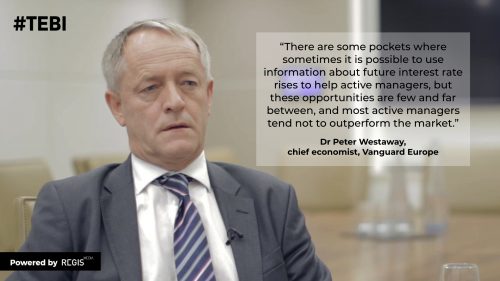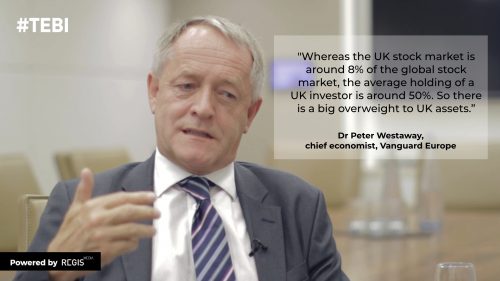Dr PETER WESTAWAY is chief economist and head of investment strategy for Vanguard Asset Management in Europe. He was previously chief economist for Nomura International and a senior official at the Bank of England.
He has a PhD in economics and an MPhil in control engineering and operational research from the University of Cambridge, and a BSc in mathematics and economics from the University of York.
We recently conducted a wide-ranging interview with Peter, which we’ve divided into two parts. In Part 1, he discusses the extent to which the economy and the markets are, and aren’t, related; why investors should avoid trying to predict the outcome of referenda and elections; and why sticking with a broadly diversified portfolio is always the most sensible approach.
Peter Westaway, how much of a connection do you think there is between the economy and economic growth on the one hand and stock markets and stock market valuations on the other?
Well, there are connections between economic growth and the stock markets, but those connections aren’t as automatic and obvious as you might automatically think. For example, if you look at the countries with the fastest GDP growth, they’re not necessarily the ones with fastest stock market growth.
Where there is a connection, though, is when you get an unexpected shock to a particular country’s GDP. So if, say, UK GDP suddenly comes out more strongly than people have been expecting, what you would expect to see is a surge in that stock market.
In other words, existing growth is already reflected in the price. So, for example, the fact that China grows more quickly than the UK should already be reflected in the stock market. You can’t expect Chinese stock markets to always outperform the UK.
So it’s very much about whether you can you predict what is going to happen better than everybody else before it happens. If you can, and you position your portfolio accordingly, then you will benefit from the surge in the stock market. But of course it’s really difficult to be systematically better at predicting what is going to happen in the economy than everyone else.
The returns investors receive are the reward for the risk they take, and you would say, presumably, it’s no different with emerging markets?
That’s right. It’s the case that countries like India and a lot of emerging markets may tend to generate better stock market returns, but as much as anything that is because those countries are more risky. So you will get periods when growth is strong and that will be reflected in strong stock market growth, but often the performance in those economies is very volatile and so investors need a reward for that extra degree of uncertainty that maybe isn’t so much the case with a country like the US, for example. So that’s really what it is — it’s a reward for risk, for investing in riskier markets.
So, how interested should investors be in economics? As far as making sensible investment decisions is concerned, to what extent should they pay attention to interest rate rises and so on?
For many investors, especially investors who have a long-term horizon, I think it is important and reassuring to understand what the economic backdrop is. But then to use that information to try to second-guess everybody else and to try to eke that extra bit of return out of their portfolios is a bit of a fool’s errand.
One of the things I say a lot to investors is that I spend all of my time looking at these issues, but I wouldn’t like to claim that I could systematically beat the market because of my insights. There are some pockets where sometimes it is possible to use information about future interest rate rises to help active managers, but these opportunities are few and far between, and most active managers tend not to be able to outperform the market.
We’ve had some major political events in the last couple of years — Brexit, Donald Trump becoming US President, elections in the UK and France, and so on. In many cases the results came as a surprise. So what are the lessons for investors to learn?
I think the lessons from those political events are very much consistent with the more general lesson about the difficulties of trying to time markets. These political events were very difficult to predict in advance, particularly Brexit and Trump. A few months beforehand they were completely off the radar. But what is interesting is that even if you had been able to predict these events in advance, being able to predict how the markets were going to respond to those events once they happened was also very difficult. So we saw for example in the UK the stock markets didn’t collapse after Brexit — the currency did but the stock markets didn’t. In the US we actually saw the opposite. The stock markets started to surge on the expectation of some expansionary policies, and again, most investors, even so-called informed investors, wouldn’t have been positioned for that. So it just illustrates that it is very difficult for even informed investors to predict and profit from these events in advance.
When faced, then, with what look like compelling arguments that such-and-such a party will win a particular election, what should an investor do?
I think what’s interesting is that by the time there is some information that is compelling and becomes the consensus view, then by that point, even if it turns out to be true, that’s probably already priced into the market, so you’ve missed the opportunity by then to profit from it. That’s the irony.
Really it’s about being able to predict those events when no one else has been able to. That’s what’s really difficult and some people get paid a lot of money to do that, but the reality is, on average, most of those don’t deliver.
What’s the alternative strategy to that? It’s really having a portfolio of investments that aren’t loaded up on particular political events. So if you’re worried about Donald Trump being elected or not being elected then don’t put all of your portfolio in the US. Just have part of your portfolio in the US, part of your portfolio in the UK and so on.
We spend a lot of time trying to persuade investors to have a diversified portfolio. A good starting point for diversification is to ask how important each country’s stock market is in the overall world stock market. So, for example, if you look at the UK economy, that should have a roughly 8% weight in your overall portfolio because that’s roughly the weight of the UK stock market in the world stock market.
As you know, most UK investors have far more than an 8% exposure to UK stocks. Investors all over the world, in fact, tend to overweight domestic assets, don’t they?
Yes, this is what we call home bias. The idea of home bias is that investors will systematically tend to overweight assets, whether it’s equities or fixed income, from their home market. So, for example, in the UK, whereas the UK stock market is around 8% of the global stock market, the average holding of a UK investor is around 50%. So there is a big overweight to UK assets.
Now that’s not necessarily wrong or disastrous, but what it does mean is that, as an investor, you are taking an overweight position in the sectors that the UK happens to be more involved in. Often that comes about because people are more comfortable and familiar with UK companies than they are with overseas companies. They think, “This is good company so I’ll invest in that”. Investment theory would tell you that diversification is a much better place to start.
Now there are some nuances to that argument. Obviously currency denomination is important, and some people may decide they don’t want to expose their portfolio to currency risk, and that overweighting to home markets is a way of avoiding it. That’s not always the best way to get away from currency risk though. We think that in fixed-income markets, for example, it is much easier just to hedge out — buy a type of asset that’s hedged out — so you no longer expose your overseas bonds to currency fluctuations.
With equities you could hedge that out as well, although we think having un-hedged equity exposure is sometimes a benefit because it doesn’t necessarily add volatility to your portfolio. Sometimes a local stock market and local currency will go in the opposite direction and cancel each other out.
So, overall, the reasons for home bias that are exhibited in investors don’t usually stand up to serious scrutiny as an investment strategy.
Diversifying across different markets, and within different markets, is a central to Vanguard’s investment philosophy. Why do you think it’s so important?
What’s interesting about equities is that if you look through time at where growth in the overall stock market is coming from, actually quite a lot of the growth comes from a relatively small number of companies. The trouble is you don’t know which those companies are going to be in advance. It’s not always the same ones. So even though it is quite tempting to think you’re going to be able to pick those winners in advance, in practice that is very difficult. So really the only way of guaranteeing that you’re going to be invested in the stocks that grow the most strongly is to have a diversified portfolio which effectively hedges your bets and keeps you invested in all of them.
There are those who argue that you can over-diversify — that, beyond a certain point, diversification does more harm than good. What’s your view on that?
I think it depends how far out you’re talking about. Let’s think about equities. For me it is difficult to be too diversified because if you keep your portfolio very homed in on developed country equities, yes, you’re going to have less volatility, but you will miss out on some of the higher gains you’ll get in emerging markets. If you skew your portfolio too much towards emerging markets you’ll give yourself too much volatility. Having a diversified portfolio that gives you that mix of the safer more reliable returns and the slightly more racy (but in the long run better) returns is a better way to go.
So, as a general rule, diversification tends to work well. Overall I think it is hard to go too far.
In Part 2, Peter Westaway discusses market timing in more detail. He also explains why it’s so critical for investors to control their costs, and whether we should all be prepared for lower investment returns in the future.
The Evidence-Based Investor is produced by Regis Media, a boutique provider of content and social media management to financial advice firms around the world. For more information, visit our website and YouTube channel, or email Sam Willet or Christina Waider.












